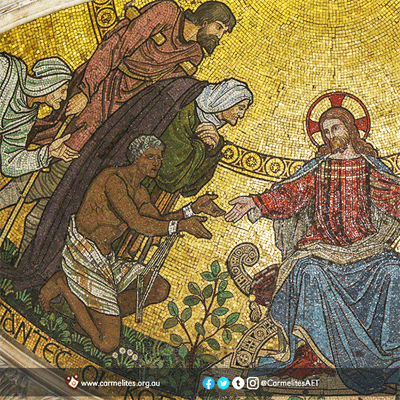 For people in Biblical times, the experience of illness provoked fear and uncertainty. Often it was thought that illness was the result of sin and the sick treated as evil sinners. The healing ministry of Jesus is not about him ‘showing off’ nor about proving that he was the Son of God. Jesus heals because the life and love of God within him can do nothing else but reach out to people in trouble. These healing stories are never just about curing a physical ailment. There is always a sense of ‘restoration’ – people are made whole, able to work again, able to return to their families, communities, and synagogue. This Sunday's Gospel is full of healing stories.
For people in Biblical times, the experience of illness provoked fear and uncertainty. Often it was thought that illness was the result of sin and the sick treated as evil sinners. The healing ministry of Jesus is not about him ‘showing off’ nor about proving that he was the Son of God. Jesus heals because the life and love of God within him can do nothing else but reach out to people in trouble. These healing stories are never just about curing a physical ailment. There is always a sense of ‘restoration’ – people are made whole, able to work again, able to return to their families, communities, and synagogue. This Sunday's Gospel is full of healing stories.
On leaving the synagogue, Jesus went with James and John straight to the house of Simon and Andrew. Now Simon’s mother-in-law was in bed with fever, and they told him about her straight away. He went to her, took her by the hand and helped her up. And the fever left her and she began to wait on them.
That evening, after sunset, they brought to him all who were sick and those who were possessed by devils. The whole town came crowding round the door, and he cured many who were suffering from diseases of one kind or another; he also drove out many devils, but he would not allow them to speak, because they knew who he was.
In the morning, long before dawn, he got up and left the house and went off to a lonely place and prayed there. Simon and his companions set out in search of him, and when they found him they said, ‘Everybody is looking for you.’ He answered, ‘Let us go elsewhere, to the neighbouring country towns, so that I can preach there too, because that is why I came.’
And he went all through Galilee, preaching in their synagogues and casting out devils. (Mark 1:29-39)
The story of Jesus’ first day of ministry in Capernaum continues in the Gospel for this Sunday. After leaving the synagogue where he has healed the possessed man Jesus goes to Simon’s house. He heals Simon’s mother-in-law and restores her to her rightful place as hospitality provider - a sacred ministry in Jewish households. No words are spoken. Jesus simply holds her hand and helps her up. In doing so he would have broken taboos about touching a sick person, and touching a woman to whom he was not related. But in Mark’s Gospel law and custom cannot stand in the way of God’s healing power.
That evening, after sunset, after the Sabbath day was over, people begin to bring the sick and possessed to Jesus for healing.
Notice how ‘local’ all these elements of Mark’s story are: a local man in the local synagogue, a local woman in her own house, local people crowd around the door, local people are brought for healing.
In all the healing stories, Mark presents Jesus in conversation with each individual. There are no ‘en masse’ healings – each person gets individual treatment – sometimes with words, sometimes by touch, sometimes both. There is a sense of intimacy in Jesus’ healing ministry.
Interestingly, the devils seem to know exactly who Jesus is, but the human beings take much longer to recognise Jesus.
In the early morning Jesus goes off to pray by himself. Jesus prays both in public worship in the Synagogue and in moments of quiet communion with God. Mark helps us understand that both are necessary for would-be disciples. Jesus begins and ends his day in prayer.
When they find Jesus the disciples beg him to return to the town, but Jesus has other ideas. His preaching and healing is not only for the people of Capernaum, but for the whole people of Galilee.
No doubt, the disciples enjoyed being in the presence of such a wonder-worker as Jesus! But Jesus’ focus is not himself; it is his mission of proclaiming the Good News of God’s love through healing words and actions. The healing stories underline the idea that contact with God through the person of Jesus brings healing and wholeness, not death and destruction.
The preaching of Jesus together with the healing/wholeness stories is fundamentally about the transformation of real, living human beings into the new People of God.
Download our Celebrating At Home liturgy for this Sunday here:
Celebrating At Home - 5th Sunday in Ordinary Time [PDF]
Celebrating At Home - 5th Sunday in Ordinary Time [ePub]